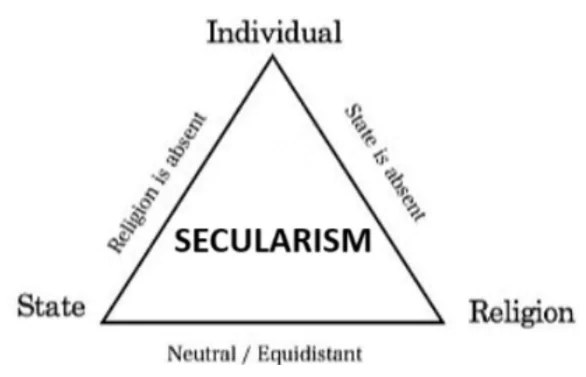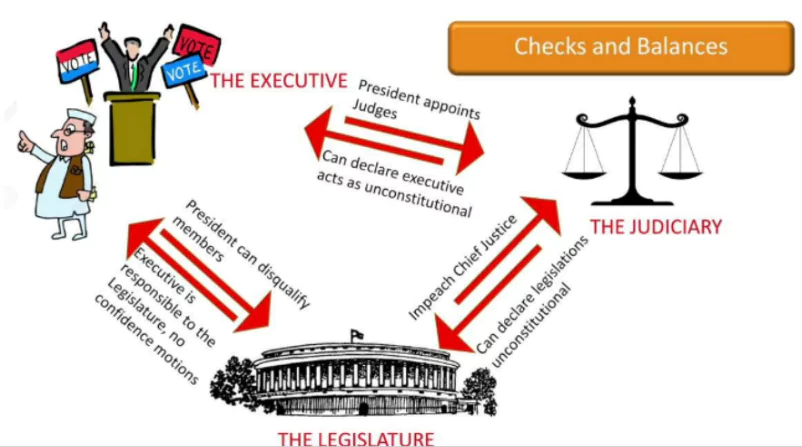Concerns have been raised about the Prime Minister’s visit to the Chief Justice’s residence for Ganapati puja.
More About the News
- The criticism is based on a 16-point document on judicial values adopted in a Full Court Meeting of the Supreme Court on May 7, 1997.
Ethical Issues Associated with the visit of PM to CJI’s Residence
- Conflict of Interest: Such personal interactions may create a perceived or actual conflict of interest, compromising the judge’s ability to remain impartial, especially in cases involving the government.
 Undermining the Constitution’s Secular Framework: Public participation in a religious event by constitutional authorities violates the secular principles enshrined in the Constitution, potentially leading to concerns of religious favoritism
Undermining the Constitution’s Secular Framework: Public participation in a religious event by constitutional authorities violates the secular principles enshrined in the Constitution, potentially leading to concerns of religious favoritism- Appearance of Impropriety: Even if no impropriety occurs, the appearance of impropriety can erode public trust. Judges are ethically obliged to avoid situations that might lead a reasonable person to question their integrity.
- Judicial Impartiality: Maintaining impartiality is crucial. Socializing with the head of the executive branch can cast doubt on a judge’s neutrality, violating ethical standards of unbiased adjudication.
- Separation of Powers: Ethically, judges must uphold the constitutional principle of separation of powers. Personal engagements with the executive may blur the distinct boundaries between the judiciary and the executive.
- Public Confidence: Judges have an ethical duty to preserve public confidence in the judiciary’s independence and integrity. Such visits may diminish public perception of judicial independence.
- Adherence to Ethical Codes: The Restatement of Values of Judicial Life advises judges to maintain a degree of aloofness consistent with their office’s dignity, avoiding actions that could diminish the judiciary’s esteem.
- Potential for Bias: Ethical standards require judges to avoid situations that could lead to conscious or unconscious bias, ensuring fair and just legal proceedings.
Enroll now for UPSC Online Course
Constitutional Provision and Judicial Precedents Ensuring Separation of Power
The separation of powers is an organisational structure in which responsibilities, authorities, and powers are divided between groups (branches of government) rather than being centrally held.

- Article 50 (Directive Principles of State Policy): This article explicitly mandates the separation of the judiciary from the executive, promoting judicial independence in matters of public administration.
- Article 13 (Judicial Review): It empowers the judiciary to review the actions of the executive and legislative branches to ensure that they comply with the Constitution. It establishes the judiciary’s role as a watchdog over constitutional violations.
- Doctrine of Judicial Review: The judiciary has the power to strike down laws and executive actions that are inconsistent with the Constitution. This doctrine ensures that the judiciary acts as a check on the other branches.
- Basic Structure Doctrine (Kesavananda Bharati Case, 1973): The Supreme Court ruled that the separation of powers is part of the basic structure of the Constitution, meaning it cannot be altered by amendments.
- Judges’ Appointment: The judiciary is involved in its own appointments through the collegium system, ensuring that executive influence is minimised in the selection of judges.
- Code of Conduct for Judges (Restatement of Judicial Values): This document outlines ethical principles, including the need for judicial aloofness from the executive, ensuring that the judiciary remains independent in perception and practice
Values of Judicial Life
- Impartiality and Perception: Judges must act in ways that maintain public faith in judicial impartiality, avoiding any behavior that erodes credibility.
- Avoidance of Elections: Judges should not contest or hold elective office in clubs or societies, except those related to law.
- Limited Bar Association: Judges must avoid close personal associations with lawyers practicing in their courts.
- Family Recusal: Judges must not allow close family members who are lawyers to appear before them or be involved in their cases.
- No Use of Judicial Residence for Professional Work: Judges must not allow family members to use their residence for professional legal work.
- Maintain Dignified Aloofness: Judges should practice an appropriate level of distance consistent with the dignity of their office.
- Recusal from Family and Friends’ Cases: Judges must not hear cases involving close family, friends, or close relations.
- No Public Political Involvement: Judges must not publicly express views on political matters or cases that are pending or likely to arise.
- Speak Through Judgments: Judges should avoid media interviews, letting their judgments speak for themselves.
- No Acceptance of Gifts or Hospitality: Judges should not accept gifts or hospitality, except from close family and friends.
- Conflict of Interest Disclosure: Judges must disclose any financial interest in cases and recuse themselves if necessary.
- No Speculation in Shares: Judges should avoid speculative financial activities, like trading stocks or shares.
- Prohibition on Business: Judges must not engage in trade or business, except for writing or hobby-related activities.
- No Fundraising: Judges must not solicit funds or associate with any fundraising activities.
- Clarification of Financial Benefits: Judges should not seek financial benefits beyond those clearly available to their office.
- Public Scrutiny Awareness: Judges must always be mindful of their public image and avoid actions that diminish the esteem of their office.
Check Out UPSC CSE Books From PW Store
![]() 14 Sep 2024
14 Sep 2024
 Undermining the Constitution’s Secular Framework: Public participation in a religious event by constitutional authorities violates the secular principles enshrined in the Constitution, potentially leading to concerns of religious favoritism
Undermining the Constitution’s Secular Framework: Public participation in a religious event by constitutional authorities violates the secular principles enshrined in the Constitution, potentially leading to concerns of religious favoritism
